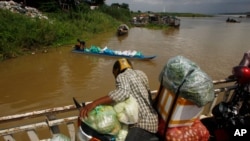“A river is not merely a geographic feature. It is an essential, fundamental basis of human life,” Assistant Secretary for East Asian and Pacific Affairs David Stilwell noted in opening remarks at the recent inaugural Indo-Pacific Conference on Strengthening Governance of Transboundary Rivers.
“And the people of the Mekong particularly know this truth,” he said, “because they are living with the terrible consequences of upper riparian water control, with increasing and devastating impact on the lives of tens of millions for whom the Mekong represents life itself.”
The East-West Center, or EWC, in partnership with the U.S. Department of State and the Mekong-U.S. Partnership, hosted the virtual conference on Thursday, October 15, 2020, convening policy-makers, academics, members of civil society, and other transboundary river stakeholders from across the Indo-Pacific region to share best practices related to the sustainable development and cooperative management of transboundary rivers.
Assistant Secretary Stilwell highlighted the new Mekong-U.S. Partnership and its role in expanding U.S. engagement with the five countries of the Mekong sub-region. He underscored the United States’ commitment to the Mekong region, as evidenced by the $3.9 billion the United States provided in the region since 2009, as well as our enduring support to the Mekong River Commission, or MRC, and transparent transboundary river governance.
Assistant Secretary Stilwell also raised U.S. concerns over China’s unilateral manipulation of Mekong River flows and the need for comprehensive, year-round water data sharing through the MRC.
In closing remarks, U.S. Ambassador to Thailand Michael DeSombre said, “success in the Mekong region will depend not only on strong institutions and partnerships, but on transparent flow of data as well. That is why the United States created the Mekong Water Data Initiative with input from more than 60 government and NGO partners to improve data sharing and science-based decision making. The MekongWater.org platform, announced by Secretary Pompeo last year, includes more than 40 tools covering everything from weather forecasting to citizen science.” He said the U.S. “plans to unveil a major upgrade to this platform in coming weeks.”
The United States, along with its friends and allies from across the globe, is committed to continued partnership with Mekong region countries to build a prosperous, sustainable, and healthy future based on these shared resources.






